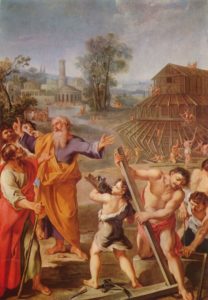Shavua tov, everyone. I am just back from Rabbi Allan Finkel’s installation as rabbi for Temple Shalom, the Reform synagogue in Winnipeg. What a weekend. Rabbis Stewart Gordon of NYC joined us as did Rabbi Billy Love, a rabbi/lawyer/judge from Philadelphia, who sat on our beit din in New York when we were ordained. We celebrated Rabbi Allan’s installation with a grand reunion over much eating! We seem to have a direct link between Winnipeg and Victoria – with much to celebrate.
 This week we are reading about Noach building his ark – a reading that always seems to coincide with our rainiest weather. Some of us can almost imagine a similar response to teeming rains. Last week we read about Creation and the first human’s exile from Gan Eden, the Garden of Eden – this week we read about the destruction and possible end of the world. And then – a re-creation, announced with a simple sprig of leaves from a tree announcing hope and new life.
This week we are reading about Noach building his ark – a reading that always seems to coincide with our rainiest weather. Some of us can almost imagine a similar response to teeming rains. Last week we read about Creation and the first human’s exile from Gan Eden, the Garden of Eden – this week we read about the destruction and possible end of the world. And then – a re-creation, announced with a simple sprig of leaves from a tree announcing hope and new life.
Rabbi Sacks has noted a particular distinction between the texts of Bereshit and Noach, noting who we are as humans fashioned in the image of God:
In Genesis 1 we read: And God said, “Let us make (hu)man in our image, according to our likeness, and let them rule over the fish of the sea, and over the birds of heaven, and over the cattle, and over all the earth, and over every moving thing that moves upon the earth. So God created (hu)man in God’s image, In the image of Self, God created him, male and female God created them. (Gen. 1:26-27)
And this is how it is stated in Genesis 9:
Whoever sheds the blood of (hu)mans, by (hu)mans shall their blood be shed; for in the image of Self, God made (hu)mans. (Gen. 9:6)
The difference here is fundamental. Genesis 1 tells me that I am in the image of God. Genesis 9 tells me that the other person is in the image of God. We are now in the realm of Torah. And that other person is not me. Which may rankle, and may grate, and may be the basis of awe!
This is the insight expressed in the famous rabbinic statement: “When a human being makes many coins in the same mint, they all come out the same. God makes us all in the same mint, the same image, His image, and we all come out different.” This is the basis of what Rabbi Sacks calls the dignity of difference.
We all are born different from each other, unique, one – but we often learn to fear those differences. Torah teaches us over and over that the work of our lives is to welcome that difference and distinction. We are none of us alike – and while each of us is unique, only God is One, Unique, the Source.
Noach
October 30, 2019 by Rabbi Lynn Greenhough • From the Rabbi's Desk Tags: noach •
Shavua tov, everyone. I am just back from Rabbi Allan Finkel’s installation as rabbi for Temple Shalom, the Reform synagogue in Winnipeg. What a weekend. Rabbis Stewart Gordon of NYC joined us as did Rabbi Billy Love, a rabbi/lawyer/judge from Philadelphia, who sat on our beit din in New York when we were ordained. We celebrated Rabbi Allan’s installation with a grand reunion over much eating! We seem to have a direct link between Winnipeg and Victoria – with much to celebrate.
Rabbi Sacks has noted a particular distinction between the texts of Bereshit and Noach, noting who we are as humans fashioned in the image of God:
In Genesis 1 we read: And God said, “Let us make (hu)man in our image, according to our likeness, and let them rule over the fish of the sea, and over the birds of heaven, and over the cattle, and over all the earth, and over every moving thing that moves upon the earth. So God created (hu)man in God’s image, In the image of Self, God created him, male and female God created them. (Gen. 1:26-27)
And this is how it is stated in Genesis 9:
Whoever sheds the blood of (hu)mans, by (hu)mans shall their blood be shed; for in the image of Self, God made (hu)mans. (Gen. 9:6)
The difference here is fundamental. Genesis 1 tells me that I am in the image of God. Genesis 9 tells me that the other person is in the image of God. We are now in the realm of Torah. And that other person is not me. Which may rankle, and may grate, and may be the basis of awe!
This is the insight expressed in the famous rabbinic statement: “When a human being makes many coins in the same mint, they all come out the same. God makes us all in the same mint, the same image, His image, and we all come out different.” This is the basis of what Rabbi Sacks calls the dignity of difference.
We all are born different from each other, unique, one – but we often learn to fear those differences. Torah teaches us over and over that the work of our lives is to welcome that difference and distinction. We are none of us alike – and while each of us is unique, only God is One, Unique, the Source.